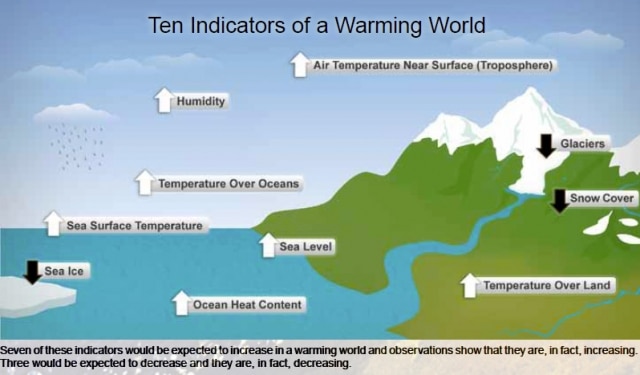Problems caused by climate change are likely already dangerous and global warming may be irreversible, according to a draft science report by a United Nations committee.
The Intergovernmental Panel of Climate Change (IPCC) report, leaked earlier this week to a number of major media organizations, said continued greenhouse gas emissions caused primarily by burning oil, coal and natural gas will probably increase the likelihood of “severe, pervasive and irreversible impacts for people and ecosystems.”
The New York Times said Tuesday the IPCC report found that continued warming is likely to “slow down economic growth, make poverty reduction more difficult, further erode food security, and prolong existing poverty traps and create new ones, the latter particularly in urban areas and emerging hot spots of hunger.”
The NYT story said runaway growth in greenhouse gas emissions is already swamping all political efforts to deal with the problem.
“Global warming is already cutting grain production by several percentage points, the report found, and that could grow much worse if emissions continue unchecked. Higher seas, devastating heat waves, torrential rain and other climate extremes are also being felt around the world as a result of human-produced emissions, the draft report said, and those problems are likely to intensify unless the gases are brought under control.”
The Associated Press said the 127-page draft report, which used the word “risk” 351 times, paints a harsh warning of what’s causing global warming and what it will do to humans and the environment.
The report said that without changes in greenhouse gas emissions, “climate change risks are likely to be high or very high by the end of the 21st century,” the AP noted.
“The report says if the world continues to spew greenhouse gases at its accelerating rate, it’s likely that by mid-century temperatures will increase by about another 3.6 degrees Fahrenheit (2 degrees Celsius) compared to temperatures from 1986 to 2005. And by the end of the century, that scenario will bring temperatures that are about 6.7 degrees warmer (3.7 degrees Celsius).”
Pennsylvania State University climate scientist Michael Mann told DeSmogBlog:
“Climate change is real, it’s caused by us, and it’s a problem that we need to contend with now. The good news is that it would be relative inexpensive if we act now. It will be far more costly if we further delay efforts to cut our carbon emissions.
“We scientists are, as a lot, conservative and staid, understated, cautious. The fact that the IPCC is framing the threat in such stark terms says it all: we must act now.”
Bloomberg News said that the report warned humankind risks causing irreversible and widespread damage to the planet unless there’s faster action to limit the fossil fuel emissions blamed for climate change.
“Possible permanent changes include the melting of the ice sheet covering Greenland,” Bloomberg said the report noted. “That would boost sea levels by as much as 7 meters (23 feet) and threaten coastal cities from Miami to Bangkok along with island nations such as the Maldives, Kiribati and Tuvalu.”
“Many aspects of climate change and associated impacts will continue for centuries, even if anthropogenic emissions of greenhouse gases cease,” Bloomberg noted the report said. “The risk of abrupt and irreversible change increases as the magnitude of the warming increases.”
IPCC Chairman Rajendra K. Pachauri said the Synthesis Report, integrating the findings the three working group contributions to the IPCC’s recent Fifth Assessment Report and two special reports, will provide policymakers with a scientific foundation to tackle the challenge of climate change.
“It would help governments and other stakeholders work together at various levels, including a new international agreement to limit climate change,” Pachauri said in a media release Monday.
The Synthesis Report integrates key messages from the three recent working group reports: the physical science basis (September 2013), impacts, adaptation, and vulnerability (March 2014), and mitigation of climate change (April 2014).
The comments received from governments will be used in a meeting in Copenhagen on October 27-31 at which time the IPCC will finalize the Synthesis Report.
The IPCC and former U.S. vice president Al Gore were awarded the 2007 Nobel Peace Prize for their combined efforts to “build up and disseminate greater knowledge about man-made climate change, and to lay the foundations for the measures that are needed to counteract such change.”
Despite the prestigious award, some scientists have repeatedly warned politicians and the public that the IPCC observations are several years out of date and, if anything, problems associated with climate change are much more severe than their reports have said.
Subscribe to our newsletter
Stay up to date with DeSmog news and alerts






